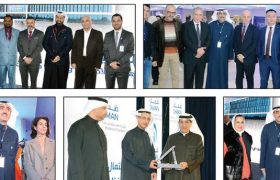Muna Nijem’s Personal Life & Company Life
The Arabia Times: Explain your background and your Company’s in detail.
Muna Nijem: I am Eng. Muna Raef Nijem from Jordan and an American citizen.
I have an Executive MBA, Finance and Business Administration, with Honors, from University of Chicago Booth School of Business, Chicago, IL 1999-2001, and a B.Sc. Electrical and Electronics Engineering.
I achieved multi-million-dollar growth and developed profitability for many companies, and built or restored market share in the telecom sector.
I’m a First Female Electronics Engineer Member and First Female Candidate for ITU Secretary General Position Presenter. I have an ITU Award for Chairing the GSR Conferences 2003
I am a visionary who sees beyond the big picture with the foresight to develop specific products, applications or services that optimize the benefits and features for added value contributing to company growth, market expansion and penetration.
All my experience was in Senior Leadership, International Business Development, Strategic Planning Manufacturing & Engineering, Research & Development, Technology.
I worked as Senior Executive Advisor at Globe.Com Solutions, and Executive Adviser / IT & Telecom Consulting Capacity-building and technical directives to restructure and liberalize telecommunications within Jordan.
I also held the position of president Chairman and (CEO) Jordan Telecom Regulatory Commission with ministerial rank, and founded the Arab telecommunications network. Before this, I worked as director of technology strategy at Motorola solutions company.
I also worked as Technical Advisor ITU, ICAO, and UNDP. I Served as U.N. Advisor tasked with training developing countries’ civil aviation agencies on the latest telecom technologies and their applications.
As for the Parkinson’s Care Association: it’s a Jordanian association licensed since 2022. It is a voluntary, non-profit organization working to serve people with Parkinson’s disease. I am the founding vice president of the association.
The association was established in cooperation with loyal partners and I work in it on a voluntary basis, out of our belief in the importance of serving Parkinson’s patients in Jordan and providing their needs and care appropriately. I also participate in other humanitarian associations, inside and outside Jordan.
Our vision is to be the leading association in the field of care, follow-up and treatment of Parkinson’s patients in Jordan, and work to improve the quality of life of patients and their families, integrate them into society, and help them provide comprehensive health care.
Our goals include raising community awareness of Parkinson’s disease and improving knowledge about it and the care and support it requires, developing programs and projects that aim to improve the lives of patients and their families, and coordinating efforts between the association and governmental and private institutions.
We also aim to support the establishment of specialized medical centers to care for Parkinson’s patients and to cooperate with local and international organizations concerned with combating and treating Parkinson’s disease, and exchanging experiences, knowledge and ideas to enhance efforts to combat the disease.
The Arabia Times: Give us one word that describes you the best.
Muna Nijem: A firm leader. I don’t give up on anything, and I continue learning and working.
Challenges faced by Muna Nijem
The Arabia Times: Can you share some highlights of your tenure as the CEO of the Communications Commission with ministerial rank? What were some of the key challenges you faced and how did you address them?
Muna Nijem: I spent most of my adult life Living and working in the USA with my family and I reached the rank of Senior Director of technology strategy at Motorola.
I was introduced to His Majesty, the King of Jordan by the then Jordanian Ambassador to the USA, while I was on a personal trip to visit my parents in Jordan.
His Majesty was impressed by my expertise and know-how. And his he directed that I be the come Chairman of the Telecom Regulatory Commission (TRC) in Jordan, with the rank of Minister. My contact was directly with the Prime Minister’s Office.
I faced many challenges, mainly:
a– I had to build the TRC from scratch.
b– Plus, I had to build the ICT sector in Jordan.
I relied heavily on my previous work experience in the USA and my extensive know-how to achieve the goals. The Prime – Minister at that time. (2002-2003) was a great help, and so was the Minister of ICT.
The Arabia Times: What are the key values which helped you to overcome the challenges in your path? Tell us something about your memorable incident in your leadership?
Muna Nijem: a- Complete Honesty.
b- I was raised by parents who had a very high sense of honesty and values. They were supportive to me all through my life:
– being the First female electronics engineer in Jordan
– excelling at school and university
My Father was my role-model, He was a Minister in the Late king Hussein’s (RIP) governments. He was extremely honest, very Kind, and very straight-forward.
Furthermore: we both were very knowledgeable in our fields and we thrived – on learning.
c- Humility
d– Lead by example
e– Put the fear of God (Allah) in front of my eyes all the time.
Faith in God encouraged me to follow high moral values and good behavior with everyone.
And I have learned through my life that values: such as honesty, justice, humility, giving, and respect for the rights of others, come with success from God’s pleasure upon us.
My belief in God Almighty contributed to strengthening my leadership personality, building positive relationships with others, achieving success at work and in my personal life.
Incident:
When I first came to Jordan to take the post, I found a huge pile of files on my desk, each containing a problem I needed to solve for the industry.
It was Ramadan at that time, so I requested a meeting with all the Chairpersons who needed my help.
I requested that all of us, come prepared with all the needed info, to go through each file, we have stayed until 2 am that day. After lots of objections, they all agreed, the meeting took places and it was a great success.
The Arabia Times: What have been the biggest challenges you’ve had to overcome during the journey of your leadership?
Muna Nijem: All paths of success face challenges that one must overcome with patience and determination. Challenges increase with the increase of responsibilities entrusted to the senior leader.
The main challenges I faced were:
A – Being away from my family.
B – Coming to a totally different culture built on people knowing people. I knew almost no-one. But with patience and perseverance I was able to connect with my staff, my clients, and my peers.
c-some of the regulations in the country then were outdated, luckily at the TRC we had.
The privilege of creating up-to-date regulations.
My successors continue the path and continue to update to keep pace with technology and meet investors’ needs.
Effective Time Management
The Arabia Times: Balancing responsibilities as a CEO with ministerial rank must have been demanding. How did you manage your time effectively to fulfill both roles?
Muna Nijem: Certainly, the issue of time management and the balance between large work responsibilities and official and social obligations is daunting in most cases, especially when you are in the position of CEO and with the rank of minister, and you are required to provide all your effort and time to implement work plans within a scheduled period of time.
So, the responsibilities were extremely demanding:
a– I had my staff to train a bring up to speed
b– I had the ICT industry to take care of and solve its issues.
I used to work (17-18) hours a day almost, 7 days/week.
Luckily my family stayed in the USA, and my Husband and my son were extremely supportive.
Path took by Muna Nijem
The Arabia Times: What was the path you took to get to where you are today?
Muna Nijem: We can achieve success despite the difficulties and challenges. In my life, I have followed a number of effective strategies and the correct methodology. This required me to persevere and devote myself to work and overcome difficulties with wisdom and intelligence.
I set myself clear goals and worked to achieve them diligently without deviating from the set path.
So, I worked on:
- a) To have enough/ more technical knowledge than whom I am dealing with.
- b) Lead by example: I had my young and bright engineers in my meetings, not only the seniors, and they had the safe platform to express their views and comments.
- c) Humility and perseverance
- d) My undivided attention to my family especially my son, who grew up with his Mother’s Traits and who is very successful, thanks God, and has his own family now.
I was always there for my husband and son no matter how busy. I am very good at balancing responsibilities.
Achievements of Muna Nijem
The Arabia Times: Could you discuss a specific accomplishment during your time as CEO that you’re particularly proud of?
Muna Nijem: I am actually proud of several things:
a– His majesty the king of Jordan issued a Royal Decree for me to be Jordan’s candidate for the position of ITU Sec.Gen.
I did not win in spite of the huge efforts from the Ministry of Exterior, but I was the First Female Candidate in the 140 Years of the ITU.
Now, The ITU Sec.Gen is a female. She is very Capable and successful. I wish her all success.
b– I and my staff created “the Arab regulators networks” which allowed all of us to exchange know-how and training.
c– I have a small group of engineers and Lawyers whom I mentor, to date. They used to work for me and when I left, they kept in touch and they seek advice.
They all achieved career-success in high positions here in Jordan and the Gulf.
d– The biggest accomplishments to Jordan is that, and according to the ICT plan (approved by the cabinet of Ministers) TRC, with All my staff was able to open Jordan for safe ICT Competition and increase the telecom penetration rate by several fold, especially to the underprivileged segments.
About the Company by Muna Nijem
The Arabia Times: The telecommunications industry is constantly evolving. How did you navigate the regulatory landscape to ensure fair competition and consumer protection?
Muna Nijem: By Continuous learning, seeking the help of international consultants who were the best in their fields, and seeking the help of international regulators who were ahead of us.
Most importantly, I made sure that all my staff were up-to-date in each step. I built my staff with me.
But let me tell you some technical information:
Telecommunications industries are often regulated by government agencies or regulatory bodies.
We had established rules, guidelines, and policies to ensure fair competition and protect consumers. we also granted licenses to operate and oversee compliance with regulations.
Regulatory authorities in Jordan set entry barriers for new players to prevent overcrowding in the market. This helped us maintain a competitive landscape while ensuring the stability of the industry.
Also, regulations ensured that consumers are not exploited by service providers. This included provisions for transparent pricing, quality of service, privacy protection, and effective complaint redressal mechanisms.
With the increasing digital nature of telecommunications, regulations related to data privacy and security is crucial. so, we were required to adhere to strict data protection standards to safeguard consumer information.
Future & Vision of Parkinson
The Arabia Times: Shifting gears to your role as Vice President of the Parkinson’s disease Care Association in Jordan, can you tell us about the organization’s mission and your involvement in its work?
Muna Nijem: The association’s mission today is to market its activities and services to Parkinson’s patients in Jordan and their families.
Protecting and caring for Parkinson’s patients and providing services that improve their quality of life.
Achieving financial sustainability and implementing an operational investment plan for the coming years by offering executable projects.
We are working to expand partnership with the authorities related to the care of Parkinson’s patients in Jordan, and to conclude a series of cooperation agreements with private and official institutions inside and outside the country.
The strategic plan mentioned in the previous question is my personal design, and I have made an effort to provide a strategic and operational vision for the association’s projects in the next few years.
The role that I play is completely voluntary, and it is a great role that takes a lot of effort, time and financial support from me in order to serve an important humanitarian sector in Jordan and serve the local community.
I strive with all my might to implement the strategic and executive plan of the Association, and I have a scheduled plan for the programs and activities of the Association.
The plan is proceeding in cooperation with my fellow members, and our goal is to serve Parkinson’s patients in Jordan in a humane and voluntary manner.
The Arabia Times: How do you see the company is changing in two years, and how do you see yourself creating that change?
Muna Nijem: Going back to the Parkinson’s Association, of which I am the Vice Chairman of our goals for the coming two years according to the strategic and executive plan of the association are:
First: Establishing a database about disease and patients in Jordan through:
- a) Signing a cooperation agreement with the health and official authorities in Jordan
- b) Signing a memorandum of understanding with the Department of Statistics
- c) Using advanced technological means to collect information.
Second: Improving support and care services provided to Parkinson’s patients in Jordan:
- Providing health, medical and psychological care for Parkinson’s patients
- Helping them to get treatment and medicines for free
- Develop counseling programs for patients and their families
- Providing the necessary equipment and technologies to improve the quality of services provided and improve the health level
Third: Paying attention to rehabilitation and training programs to enhance the capabilities of Parkinson’s patients through the implementation of various training programs aimed at developing communication skills, the daily and professional lives for patients, and providing opportunities for professional development for those wishing to work.
Fourth: Enhancing community awareness of Parkinson’s disease through:
1) Organizing media awareness campaigns in various media
2) Organizing community events open to the public to increase communication with patients
Fifth: Providing a supportive and flexible environment for Parkinson’s patients and their families:
Sixth: Developing financial resources and financing the association’s projects by adopting the establishment of a national fund for the care and treatment of Parkinson’s patients and organizing a charity festival to collect donations to cover the association’s activities and support patients.
Seventh: Building strategic partnerships with relevant institutions and government agencies to enhance services for Parkinson’s patients.
We will definitely make a change through our joint efforts in the association, and God willing, all the objectives and visions of the association will be achieved within less than two years.
Advice from Muna Nijem
The Arabia Times: What lessons from your time in regulatory leadership roles could be applied to other sectors facing rapid technological changes?
Muna Nijem: Here are some lessons that can be applied:
Proactive Monitoring and Learning: Stay informed about emerging technologies and trends. Regularly engage with experts, industry leaders, and academia to understand the potential impacts and benefits of new technologies.
Develop regulations that are adaptable and technology-neutral. Technology evolves quickly, and regulations should not become obsolete shortly after implementation.
Collaborative Approach: Engage in collaborative dialogue with stakeholders from industry, academia, advocacy groups, and the public.
- Risk-Benefit Analysis
- Agile Regulatory Frameworks: Implement an agile regulatory framework that can quickly respond to changes in technology.
- Ethical Considerations: Stay tuned to the ethical implications of emerging technologies.
- Education and Awareness: Invest in educating regulators, policy makers, and the public about emerging technologies.
- Collaborate with international counterparts to create harmonized standards for emerging technologies.
- Continue training their employees to be able to follow the vast changes taking place.
In summary, the lessons from regulatory leadership in rapidly changing technological sectors emphasize adaptability, collaboration, ethical considerations, and a forward-looking approach.
By applying these principles, sectors can harness the benefits of technological innovation while minimizing risks.
The Arabia Times: Would you like to say anything else to our viewers?
Muna Nijem: In spite of all the sacrifices, my very hard work, and the very long days, I am very proud to hear some people tell me: “Your time was the golden era”
I feel I served my king and Jordan to the best of my ability. Now, I am volunteering to serve the forgotten and the under-privileged. I am putting all my expertise and know-how in the hands of the Association.
I pray to God, every day, to grant us the strength and perseverance to plow forward.
My advice to the public in general, viewers and readers, work with dedication and sincerity, and help others achieve success.
Establishing professional relationships, mastering work professionally, and earning the
respect of others are the best ways to succeed and advance in the path of work and life.
Thank you very much, and I wish you success.
Connect Muna Nijem on LinkedIn




















































